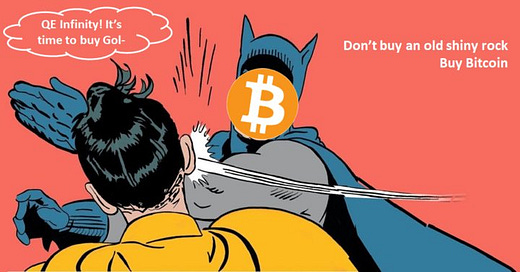Why Mike Green thinks Bitcoin is bad for Millennials
Two unique ideas about economic growth and deflationary currencies
For your studied consideration I now submit two unique ideas from an interview that Mike Green did with the indomitable Hugh Hendry. Although Mike was the conversation’s host, he still found time to introduce these two novel perspectives on Bitcoin and the guts of the financial system. I took notes and I’m ready to make a report. Let’s dive in.
1 - The collateral based system (41:30)
The first claim has to do with bank lending. Mike posits that…
“We no longer have a lending system that is based on income. Your lending is no longer measured against your borrowing capacity in terms of income. We have a lending system that is based on collateral. If I’ve got no income, but a crazy amount of assets, you will lend me almost any amount of money because you consider the collateral to be far more important than what I’m going to earn in the future. That creates a perverse incentive in which those who are already rich have effectively an unlimited capacity to borrow, while those who want to emerge on the ownership platform are discarded and treated as ineligible to borrow.”
Let’s break that down. When a bank lends money there needs to be an asset and a liability. Take a home loan, for example. When a bank issues a mortgage there is,
A liability - the money that the bank creates and then lends to the homeowner to purchase their house
An asset - the mortgage agreement whereby the homeowner agrees to pay the bank a certain amount of interest in exchange for receiving a loan
What else could act as an asset? Well, a future income stream. A bank could issue a loan to an entrepreneur because they believe the entrepreneur’s income will increase over time and he or she will pay back the loan plus interest. The problem, Mike argues, is that banks are no longer willing to issue loans based on future income.
Banks have become so risk averse that they don’t want to fund the activities that lead to real growth in the economy. Instead, banks are (by and large) only willing to lend against collateral. Who has all the collateral? The wealthy. As Mike says, “we’re further consolidating the resources into the hands of those who don’t have to spend.”
Under the current system only the rich can get loans. This concentrates wealth into fewer and fewer pockets, and significantly reduces economic growth. As Hugh phrased it (in a different interview), banks need to be “funky risk takers”. If banks are unwilling to take risks, growth is anemic.
I touched on this topic in an earlier article, and in said article I also mentioned one possible solution. We need more local banks that lend to people in the community, rather than originate mortgages to celebrities. Banks need to lend based on future income prospects, not just the availability of collateral.
2 - Bitcoin is antithetical to the interests of the young (1:10:30)
Mike argues that despite widespread adoption amongst the younger generation, Bitcoin is more beneficial to existing asset holders than those at the start of their careers.
“The embrace of a deflationary currency by a younger generation, under the argument that the money I make today I should be able to save and have it preserve its purchasing power for something way off into the future, is so antithetical to their own actual underlying interests. Inflation just effectively says that human capital is worth more than physical capital. It creates conditions under which you would expect your incomes to adjust upwards in nominal terms, deflating the debt assets, and creating conditions under which those who currently hold the assets (the older generation) are basically forced to part with them because they’ve lost their earning capacity.”
As a hard asset with a deflationary monetary policy, Bitcoin ownership tends to concentrate over time as the wealthiest investors increase their positions and those with fewer resources benefit less.
Deflationary assets tend towards concentration, whereas an inflationary asset tends towards distribution. The Millennials don’t have a lot of wealth but they do have an abundance of future earning power. The youthlings would benefit the most from an inflationary currency which decreases the value of assets and distributes spending power to workers. Bitcoin does not do this. Bitcoin is a tool for preserving existing wealth, rather than distributing it.
I’d never considered the orange coin from this angle before, but I admit that Mike’s argument makes sense. The Millennials should wish for a distribution of purchasing power out of assets into the labor market. The young have potential and time, while the boomers have assets and less time. It’s perhaps ironic then that the boomers might benefit from Bitcoin more than anyone! Yet they’re the least likely to own it. The world is full of little ironies like that.
If you found these ideas interesting be sure to follow Mike on Twitter or on his YouTube channel, where he uploads a handful of interviews each month.






